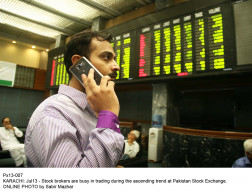
The influx of Chinese steel in the country is hurting the local industry, lamented an official, adding that the widening price difference is also causing imports to rise.
Apart from the private sector, Pakistan Steel Mills (PSM) – the only integrated steel mill in Pakistan – is also facing a stiff challenge due to Chinese imports.
“The PSM is finding it very difficult to compete in the current situation because the cheap imported steel is hurting its market just because of the price difference,” a PSM official told The Express Tribune.
Although, PSM is not producing billets – a thick steel bar that serves as a basic raw-material for different steel products – these days, it has been facing problems in selling its products owing to its higher cost of production.
According to industry officials, since January, over 100,000 tons of steel billets and hot-rolled coils have been imported from China at prices that are dramatically decreasing month after month.

This is due to the difference of over Rs6,000 between locally produced billets and the imported ones. Current steel billet prices of PSM range between Rs67,000-68,000 per ton including sales tax while the price of Chinese billets after duties and taxes at today’s prices are in the range of Rs60,000-62,000.
As the Chinese economy slows down and domestic consumption drops, the world’s largest steel manufacturing nation has a massive oversupply problem. Over the past few months, cheap steel products from China have flooded the domestic markets due to subsidies on electricity and rebates on exports provided by the Chinese government to manufacturers.
Local steel makers say that Chinese manufacturers have resorted to dump their steel products in other countries by relying on government subsidies, tariff concessions through Free Trade Agreement (FTA) and marginal cost pricing mechanisms.
The two main products manufactured by PSM are steel billets and steel hot rolled coils. In a commodity product such as steel billets and coils, margins are usually thin and with price differentials of Rs6,000 per ton, PSM is facing problems in finding buyers.
Since cheap Chinese steel imports are poised to win a larger market share, the demand for PSM products is expected to decline – leaving its management once again with cash flow issues and having to go back to the begging bowl for further handouts from the government.
Countries such as Egypt, Vietnam, Mexico, Brazil, US and India have countered this threat through imposing counter-veiling duties, regulatory duties and other non-tariff barriers to protect their local steel industry. Due to concessions given through the Free Trade Agreement and mis-declaration of non-alloy steel goods as alloy steel, the appropriate tariff barriers are not in place to protect PSM and the rest of Pakistan’s steel industry.
Published in The Express Tribune, November 27th, 2014.
Like Business on Facebook, follow @TribuneBiz on Twitter to stay informed and join in the conversation.
COMMENTS (5)
Comments are moderated and generally will be posted if they are on-topic and not abusive.
For more information, please see our Comments FAQ

1731637727-0/Bear--(1)1731637727-0-165x106.webp)

1731619853-0/ice-cream-(1)1731619853-0-165x106.webp)













steel mills need to be privatized,it has become old and uncompetitive as it has achieved its normal life therefore it is requested that it should be scrapped and new and modern and latest technology steel mills be made at its place which will not only make it competive with regard to China
@Woz: What the government subsidizes goes back into your economy. When it imports, foreign exchange flows out of the country. Also killing your companies reduces cuts jobs in Pakistan while creating jobs in Pakistan.
China is indeed lucky to have a friend/colony like Pakistan who is sacrificing itself for its higher than mountains friend
@Woz:
The business term is called "dumping" - it's where a country dumps product into a foreign market (often below cost) to support it's own industry and destroy the competition. China has been taken to court by several countries over dumping steel. Your naive if you think this is an act of a "brotherly ally".
This brother is going to end up owning the whole house! Leaving the little brother with nothing to show! I'd rather the brotherly love was not at the cost of our interests!
China is our brotherly ally and wants to supply cheap goods to bring down inflation.
We will be a superpower with their support.
The government subsidises PSM by billions, let it die and let the taxpayers and consumers benefit. Free trade will liberate us.
Woz